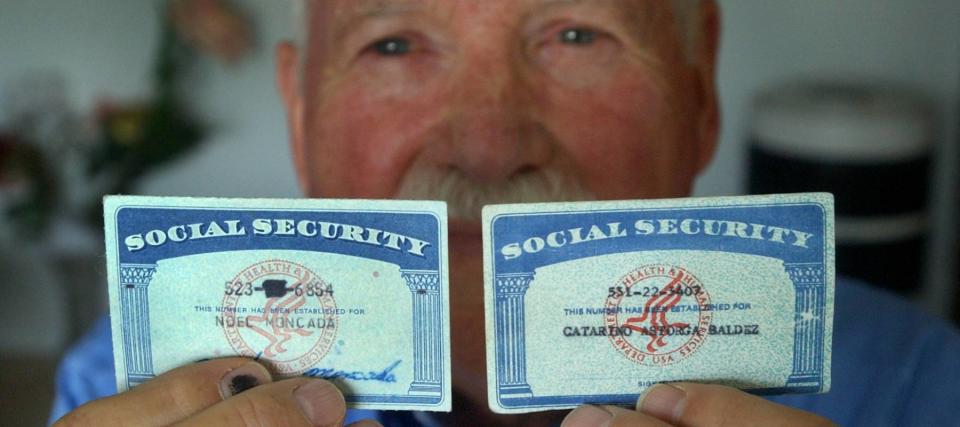It’s vital that you keep these 7 financial documents forever — here’s why

Many of us have piles of papers we’re saving "just in case,” probably gathering dust somewhere.
While some of those documents could probably head straight to the shredder, there are others that you should keep forever — and preferably not in a cardboard box in the basement.
Don't miss
Commercial real estate has beaten the stock market for 25 years — but only the super rich could buy in. Here's how even ordinary investors can become the landlord of Walmart, Whole Foods or Kroger
Cost-of-living in America is still out of control — use these 3 'real assets' to protect your wealth today, no matter what the US Fed does or says
These 5 magic money moves will boost you up America's net worth ladder in 2024 — and you can complete each step within minutes. Here's how
But sometimes we just don’t know what we need to keep (and for how long), and what we can safely get rid of.
Here are seven financial documents you shouldn’t get rid of (ever) — and why.
7 documents you should never lose
1. Birth certificate. Your original birth certificate (or adoption papers) is used to prove your age at various life stages, such as obtaining a driver’s license or applying for Social Security benefits. It will also help your family obtain a death certificate when the time comes.
2. Social Security card. You need the nine-digit number on this card to get a job, rent an apartment and collect government benefits, and you may need it to open a bank account or apply for a credit card. The Social Security Administration (SSA) recommends keeping your card in a safe place and only sharing your number when required.
3. Marriage license. Your marriage license affirms that you and your spouse did, indeed, get married. This can come in handy if you want to claim a Social Security spousal benefit in retirement.
4. Divorce records. Your settlement agreement includes the division of marital property and the terms for child and/or spousal support, so you’ll want to hang onto that. Plus, if you were married for 10 years or more (and aren’t remarried), you may be able to claim Social Security benefits based on your ex’s record.
5. Loan payoff statements. This is important if you’ve negotiated a settlement that’s less than the original debt. That’s because if the debt is sold to a debt collector, the new debt collector may not have a copy of the documentation proving that you settled under those terms.
6. Retirement and/or pension records. You’ll need these records to apply for your retirement benefits. The IRS notes that you should keep these records until all benefits are paid “and enough time has passed that the plan won’t be audited.” In other words, forever.
7. Will, living will and life insurance policies. In the event of your death — or if you’re unable to speak for yourself — your loved ones will need access to your will, living will and life insurance policies.
Ideally, you’ll want to keep your most important documents — which could be hard to replace — in a safe location so they’re protected from damage or loss, such as a safe deposit box or fire-proof, waterproof lock box or safe. Not a cardboard box in your leaky basement.
Read more: Rich young Americans have lost confidence in the stock market — and are betting on these assets instead. Get in now for strong long-term tailwinds
What about tax records?
While you don’t need to keep your tax documents forever, it’s recommended you keep them for up to seven years. The IRS can audit returns filed within the previous three years, but may add additional years (although not usually more than six).
This means you should keep all tax-related documents and receipts, though you can save space by scanning them and storing them electronically.
If you scan documents and receipts, make sure they’re legible and accessible. Plus, make sure they’re backed up regularly, so you have duplicate copies if your computer malfunctions or your data is stolen or corrupted in a cybersecurity attack.
To scan or to shred?
Other documents should be kept for a certain period of time, though you don’t need to keep them forever. For example, if you’ve taken out a loan, keep the related paperwork until you’ve paid it off, and then save the documentation that verifies you’ve paid in full.
If you own a vehicle, hold onto the vehicle title until you sell it. For other major purchases, such as computer equipment and entertainment systems, hold onto the receipts for as long as you own them in case you need to make an insurance claim.
You’ll also want to keep receipts that verify you’ve made upgrades to your home, such as replacing the roof. If you eventually sell your home and realize a capital gain, you could qualify to exclude up to $250,000 from your income (or $500,000 if you file a joint return with your spouse), according to the IRS.
As for all those other pieces of paper? Invest in a good shredder.
What to read next
Car insurance premiums in America are through the roof — and only getting worse. But 5 minutes could have you paying as little as $29/month
‘Baby boomers bust': Robert Kiyosaki warns that older Americans will get crushed in the 'biggest bubble in history' — 3 shockproof assets for instant insurance now
The 5 most expensive mistakes in options trading and how to avoid them
This article provides information only and should not be construed as advice. It is provided without warranty of any kind.

 Yahoo Finance
Yahoo Finance 